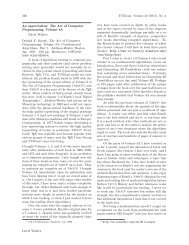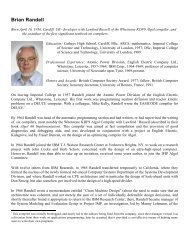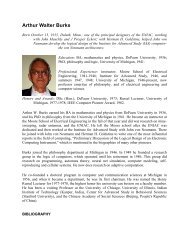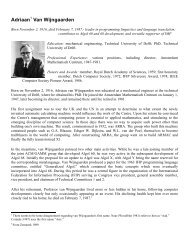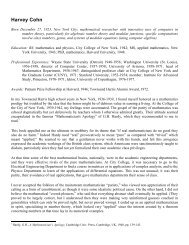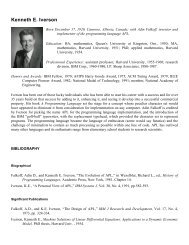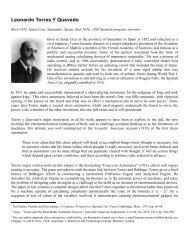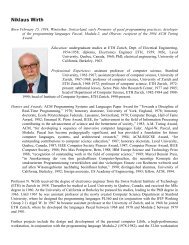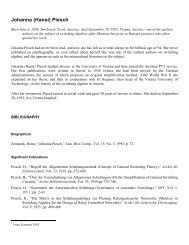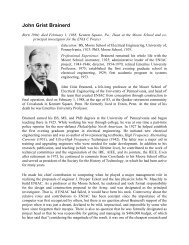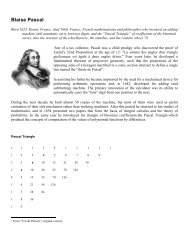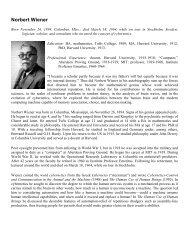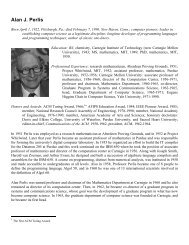Charles Babbage - Walden Family
Charles Babbage - Walden Family
Charles Babbage - Walden Family
Create successful ePaper yourself
Turn your PDF publications into a flip-book with our unique Google optimized e-Paper software.
Popularly, <strong>Babbage</strong> is a sort of Abner Doubleday of data processing, a colorful fellow whose portrait hangs in<br />
the anteroom but whose actual import is slight. He is thought about, if at all, as a funny sort of distracted<br />
character with a dirty collar. But <strong>Babbage</strong> was much more than that. He was an amazing intelligence.<br />
The Philosopher<br />
<strong>Babbage</strong> was an aesthete, but not a typical Victorian one. He found beauty in things: stamped buttons, stomach<br />
pumps, railways and tunnels, man's mastery over nature.<br />
A social man, he was obliged to attend the theater. While others dozed at Mozart, <strong>Babbage</strong> grew restless.<br />
“Somewhat fatigued with the opera [Don Juan],” he writes in the autobiographical Passages From the, Life of a<br />
Philosopher, “I went behind the scenes to look at the mechanism.” There, a workman offered to show him<br />
around. Deserted when his Cicerone answered a cue, he met two actors dressed as “devils with long forked<br />
tails.” The devils were to convey Juan, via trapdoor and stage elevator, to hell.<br />
In his box at the German Opera some time later (again not watching the stage), <strong>Babbage</strong> noticed “in the cloister<br />
scene at midnight” that his companion's white bonnet had a pink tint. He thought about “producing colored<br />
lights for theatrical representation.” In order to have something on which to shine his experimental lights,<br />
<strong>Babbage</strong> devised “Alethes and Iris,” a ballet in which sixty damsels in white were to dance. In the final scene, a<br />
series of dioramas were to represent Alethes' travels. One diorama would show animals “whose remains are<br />
contained in each successive layer of the earth. In the lower portions, symptoms of increasing heat show<br />
themselves until the centre is reached, which contains a liquid transparent sea, consisting of some fluid at white<br />
heat, which, however, is filled up with little infinitesimal eels, all of one sort, wriggling eternally.”<br />
Two fire engines stood ready for the “experiment of the dance,” as <strong>Babbage</strong> termed the rehearsal. Dancers<br />
“danced and attitudinized” while he shone colored lights on them. But the theater manager feared fire, and the<br />
ballet was never publicly staged.<br />
<strong>Babbage</strong> enjoyed fire. He once was baked in an oven at 265' for “five or six minutes without any great<br />
discomfort,” and on another occasion was lowered into Mt. Vesuvius to view molten lava. Did he ponder hell?<br />
He had considered becoming a cleric, but this was not an unusual choice for the affluent graduate with little<br />
interest in business or law. In 1837 he published his Ninth Bridgewater Treatise, to reconcile his scientific<br />
beliefs with Christian dogma. <strong>Babbage</strong> argued that miracles were not, as Hume wrote, violations of laws of<br />
nature, but could exist in a mechanistic world. As <strong>Babbage</strong> could program long series on his calculating<br />
machines, God could program similar irregularities in nature.<br />
<strong>Babbage</strong> investigated biblical miracles. “In the course of his analysis,” wrote B.V. Bowden in Faster than<br />
Thought (Pitman, London, 1971), “he made the assumption that the chance of a man rising from the dead is one<br />
in 10 12 .” Miracles are not, as he wrote in Passages From the Life of a Philosopher, “the breach of established<br />
laws, but ... indicate the existence of far higher laws.”<br />
The Politician<br />
Of all his roles, <strong>Babbage</strong> was least successful at this one. He had himself to blame: he was too impatient, too<br />
severe with criticism, too crotchety. Bowden wrote that in later life <strong>Babbage</strong> “was frequently and almost<br />
notoriously incoherent when he spoke in public.” What ultimately kept him from building an Analytical Engine



